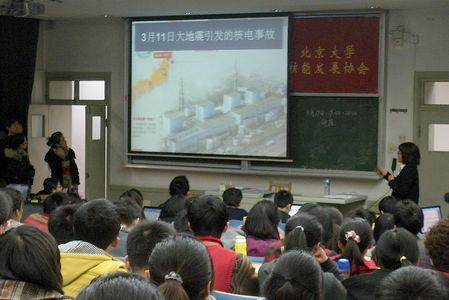Peking University, Mar. 24, 2011: Professor Guo Qiuju, a senior professor of radiation protection from School of Physics, Peking University, gave a lecture entitled "The Truth of Japanese Nuclear Accident and the Future of Nuclear Energy's Development and Safety" on the evening of March 19, at Room 103 of Natural Science Classroom Building. The lecture was co-organized by the Youth League Committee and the Association for the Development of Nuclear Energy.

"I'm more than glad to see you here for a lecture instead of rushing for iodized salt (which according to rumor, can help resist radiation)." Professor Guo opened the lecture addressing to the latest so-called anti-radiation approach.
"Not all nuclear accidents are of the same severity with the Chernobyl nuclear accident." Professor Guo also said the individual dose limit of radiation is 1 mSv per year, according to the international basic safety standards. Even if it is true that the media claimed Japanese local Nuclear radiation is already 20 times that of natural background radiation dose, it is still very insignificant. A simple CT scan can give the same radiation as received within 20 km of the Fukushima Nuclear plant.
The top priority of the Fukushima Nuclear Accident is to recover the power supply system to cool down the reactor and prevent the leakage of radioactive material. Explosions have already taken place in more than one reactors. The cooling water has almost been drained in No.3 reactor, where the radioactive fuel is more dangerous. But the good news is, by the lecture was given, the nuclear plant has begun to restore part of the power supply.
Professor Guo said that Japan changed its law immediately to allow the emergency personnel to carry out the mission. The upper limit of radiation for emergency personnel to enter the accident site was raised from 100 mSv to 250 mSv. But as for the rumor that the emergency personnel are the "Expendables", Professor Guo said that it does not make sense in that the individual radiation dose could be controlled within limit by reducing the work time of individual workers.
As for the most concerned question how this accident would affect China, Professor Guo said it would not have obvious impact on China, at least for the time being. There would be generally west wind in the following three days so the radioactive material would be carried to the Pacific. Offshore China would not suffer from significant radiation contamination nor would it affect the production of the iodized salt.
The listeners present included students from School of Electronic Engineering and Computer Science, School of Law, School of International Relations, School of Mathematical Science, School of Government, as well as School of Foreign Languages of Peking University. Some students from other universities and the middle-aged also joined in the lecture. Everyone was participating actively. The lecture lasted till 21:20 p.m..
After the lecture, many students commented it well in time. The Japanese nuclear accident has caused panic because of most people's insufficient knowledge of nuclear, especially nuclear leakage. The lecture contributed to the better understanding of nuclear and helped to handle Japanese nuclear accident in a more rational way.
Extended Reading:
President Zhou Qifeng s letter to PKU Japanese teachers and students
Love shown for Japan and Yunnan victims
PUTH rescue team ready to go to Japan for nuclear radiation emergency
Film show: NHK Emergency Reporting of the Japan earthquake
Translated by: Ma Xiao
Edited by: Chen Miaojuan
Source: PKU News (Chinese)





